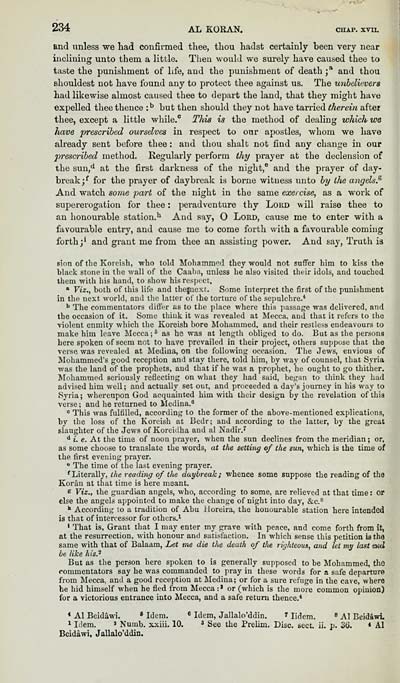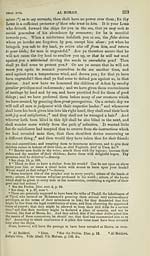Download files
Complete book:
Individual page:
Thumbnail gallery: Grid view | List view

234 AL KORAN. CHAP. xvu.
and unless we had confirmed tliee, thou hadst certainly been very near
inclining unto them a little. Tlien would we surely have caused thee to
taste the punishment of life, and the punishment of death ;* and thou
shouldest not have found any to protect thee against us. The unbelievers
had likewise almost caused thee to depart the land, that they might have
expelled tliee thence :^ but then should they not have tarried therein after
thee, except a little while." This is the method of dealing which we
have prescribed ourselves in respect to oar apostles, whom we have
already sent before thee : and thou shalt not find any change in our
jirescrihed method. Regularly perform thy prayer at the declension of
the sun,<^ at the first darkness of the night,* and the prayer of day-
bi'eak;^ for the prayer of daybreak is borne witness unto hy the angels.^
And watch some part of the night in the same exercise, as a work of
supererogation for thee : peradventure thy Lord will raise thee to
an honourable station.^ And say, Lord, cause me to enter with a
favourable entry, and cause me to come forth with a favourable coming
forth;' and grant me from thee an assisting power. And say, Truth is
sion of the Koreish, who told Mohammed they would not suffer him to kiss the
black stone in the wall of the Caahii, unless he also visited their idols, and touched
them with his hand, to show his resptct.
■ Viz., both of this life and the|next. Some interpret the first of the punishment
in the next world, and the latter of the torture of the sepulchre.*
^ The commentators differ as to the place where this passage was delivered, and
the occasion of it. Some think it was revealed at Mecca, and that it refers to the
violent enmity which tlie Koreish bore Mohammed, and their restless endeavours to
make him leave Mecca;* as he was at length obliged to do. But as the persons
here spoken of seem not to have prevailed in their project, others suppose that the
verse was revealed at Medina, on the following occasion. The Jews, envious of
Mohammed's good reception and stay there, told him, by way of counsel, that Syria
was the land of the prophets, and that if he was a prophet, he ought to go thither.
Mohammed seriously reflecting on what they had said, begun to think they had
advised him well; and actually set out, and proceeded a day's journey in his way to
Syria ; whereupon God acquainted him with their design by the revelation of this
verse; and he returned to Medina.^
" This was fulfilled, according to the former of the above-mentioned explications,
by the loss of the Koreish at Bedr; and according to the latter, by the great
slaughter of the Jews of Korcitlha and al Nadir.^
<* i. e. At the time of noon prayer, when the sun declines from the meridian; or,
as some choose to translate the words, at the setting of the sun, which is the time of
the first evening prayer.
* The time of the last evening prayer.
'Literally, the reading of the daybreak; whence some suppose the reading of the
Koran at that time is here meant.
e Viz., the guardian angels, who, according to some, are relieved at that time : or
else the angels appointed to make the change of night into day, &;c.^
'' According to a tradition of Abu Horeira, the honourable station here intended
is that of intercessor for others.^
* That is. Grant that I may enter my grave with peace, and come forth from it,
at the resurrection, with honour and satisfaction. In which sense this petition is the
same with that of Balaam, Let me die the death of the righteous, and let my last aid
be like his.^
But as the person here spoken to is generally supposed to be Mohammed, the
rommentators say he was commanded to pray in these words for a safe departure
from Mecca, and a good reception at Medina; or for a sure refuge in the cave, where
he hid himself when he fled from Mecca:' or (which is the more common opinion)
for a victorious entrance into Mecca, and a safe return thence.*
* Al Beidawi. ' Idem. * Idem, Jallalo'ddin. J lidem. « Al Beidiwi
^ Idem. » Numb, xxiii. 10. * Sec the Prehm. Disc. sect. ii. p. 36. * Al
Beidawi, Jallalo'ddin.
and unless we had confirmed tliee, thou hadst certainly been very near
inclining unto them a little. Tlien would we surely have caused thee to
taste the punishment of life, and the punishment of death ;* and thou
shouldest not have found any to protect thee against us. The unbelievers
had likewise almost caused thee to depart the land, that they might have
expelled tliee thence :^ but then should they not have tarried therein after
thee, except a little while." This is the method of dealing which we
have prescribed ourselves in respect to oar apostles, whom we have
already sent before thee : and thou shalt not find any change in our
jirescrihed method. Regularly perform thy prayer at the declension of
the sun,<^ at the first darkness of the night,* and the prayer of day-
bi'eak;^ for the prayer of daybreak is borne witness unto hy the angels.^
And watch some part of the night in the same exercise, as a work of
supererogation for thee : peradventure thy Lord will raise thee to
an honourable station.^ And say, Lord, cause me to enter with a
favourable entry, and cause me to come forth with a favourable coming
forth;' and grant me from thee an assisting power. And say, Truth is
sion of the Koreish, who told Mohammed they would not suffer him to kiss the
black stone in the wall of the Caahii, unless he also visited their idols, and touched
them with his hand, to show his resptct.
■ Viz., both of this life and the|next. Some interpret the first of the punishment
in the next world, and the latter of the torture of the sepulchre.*
^ The commentators differ as to the place where this passage was delivered, and
the occasion of it. Some think it was revealed at Mecca, and that it refers to the
violent enmity which tlie Koreish bore Mohammed, and their restless endeavours to
make him leave Mecca;* as he was at length obliged to do. But as the persons
here spoken of seem not to have prevailed in their project, others suppose that the
verse was revealed at Medina, on the following occasion. The Jews, envious of
Mohammed's good reception and stay there, told him, by way of counsel, that Syria
was the land of the prophets, and that if he was a prophet, he ought to go thither.
Mohammed seriously reflecting on what they had said, begun to think they had
advised him well; and actually set out, and proceeded a day's journey in his way to
Syria ; whereupon God acquainted him with their design by the revelation of this
verse; and he returned to Medina.^
" This was fulfilled, according to the former of the above-mentioned explications,
by the loss of the Koreish at Bedr; and according to the latter, by the great
slaughter of the Jews of Korcitlha and al Nadir.^
<* i. e. At the time of noon prayer, when the sun declines from the meridian; or,
as some choose to translate the words, at the setting of the sun, which is the time of
the first evening prayer.
* The time of the last evening prayer.
'Literally, the reading of the daybreak; whence some suppose the reading of the
Koran at that time is here meant.
e Viz., the guardian angels, who, according to some, are relieved at that time : or
else the angels appointed to make the change of night into day, &;c.^
'' According to a tradition of Abu Horeira, the honourable station here intended
is that of intercessor for others.^
* That is. Grant that I may enter my grave with peace, and come forth from it,
at the resurrection, with honour and satisfaction. In which sense this petition is the
same with that of Balaam, Let me die the death of the righteous, and let my last aid
be like his.^
But as the person here spoken to is generally supposed to be Mohammed, the
rommentators say he was commanded to pray in these words for a safe departure
from Mecca, and a good reception at Medina; or for a sure refuge in the cave, where
he hid himself when he fled from Mecca:' or (which is the more common opinion)
for a victorious entrance into Mecca, and a safe return thence.*
* Al Beidawi. ' Idem. * Idem, Jallalo'ddin. J lidem. « Al Beidiwi
^ Idem. » Numb, xxiii. 10. * Sec the Prehm. Disc. sect. ii. p. 36. * Al
Beidawi, Jallalo'ddin.
Set display mode to: Large image | Transcription
Images and transcriptions on this page, including medium image downloads, may be used under the Creative Commons Attribution 4.0 International Licence unless otherwise stated. ![]()
| Early Gaelic Book Collections > J. F. Campbell Collection > Koran: or, Alcoran of Mohammed > (388) |
|---|
| Permanent URL | https://digital.nls.uk/77138363 |
|---|
| Description | Volumes from a collection of 610 books rich in Highland folklore, Ossianic literature and other Celtic subjects. Many of the books annotated by John Francis Campbell of Islay, who assembled the collection. |
|---|
| Description | Selected items from five 'Special and Named Printed Collections'. Includes books in Gaelic and other Celtic languages, works about the Gaels, their languages, literature, culture and history. |
|---|

